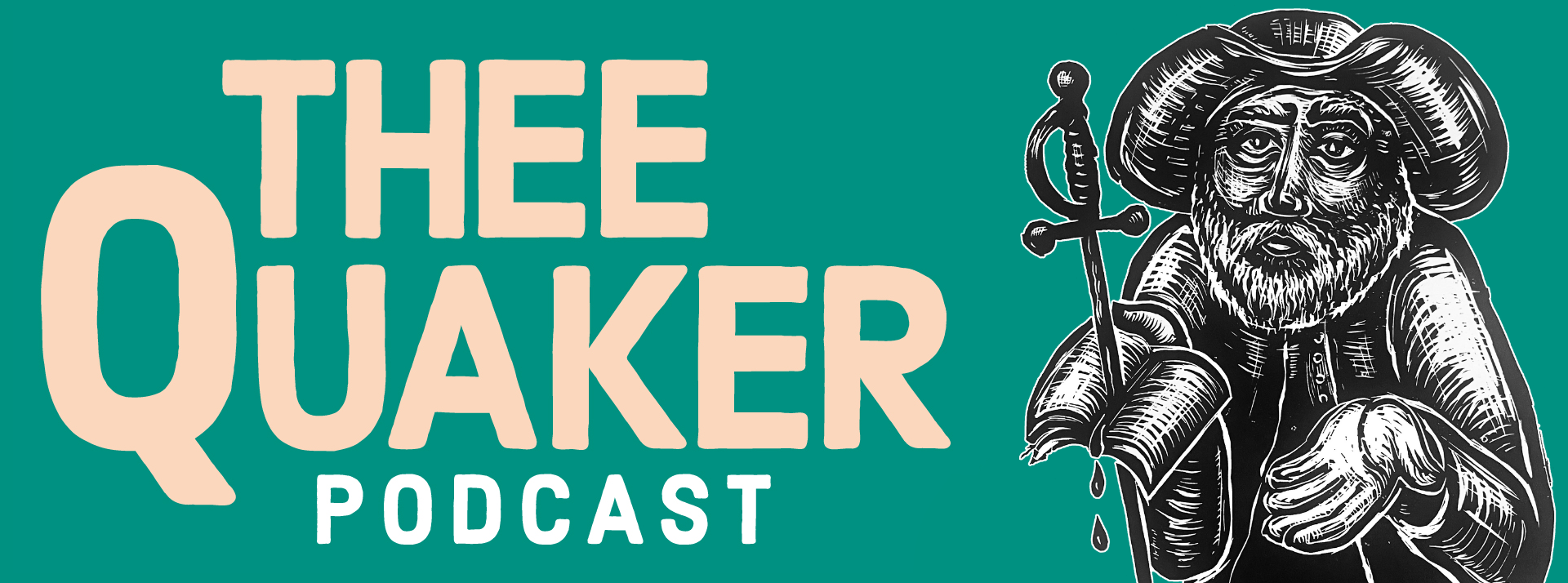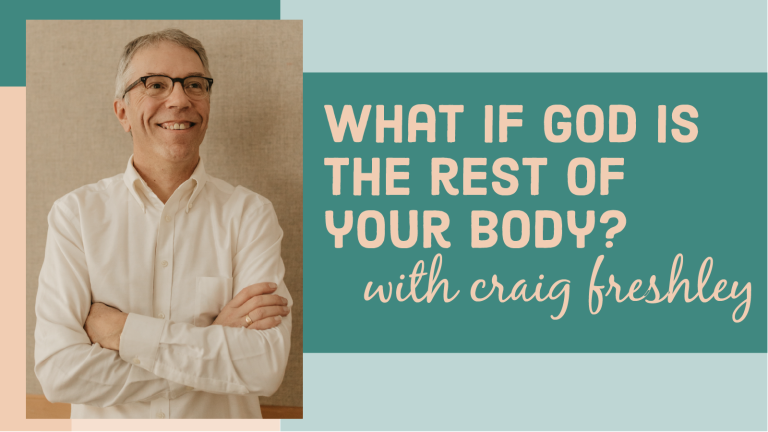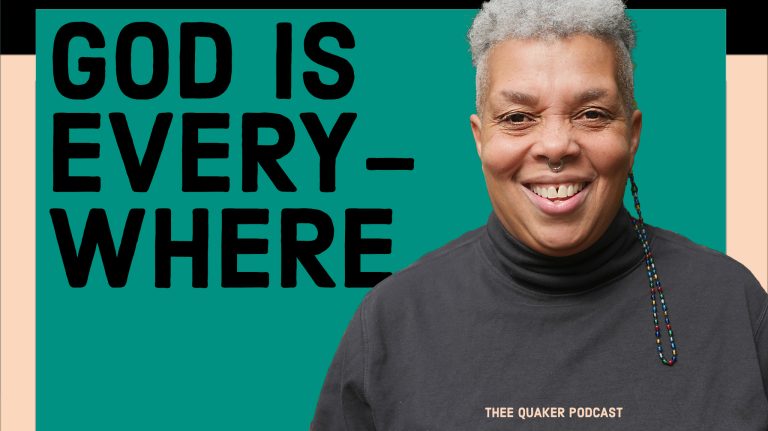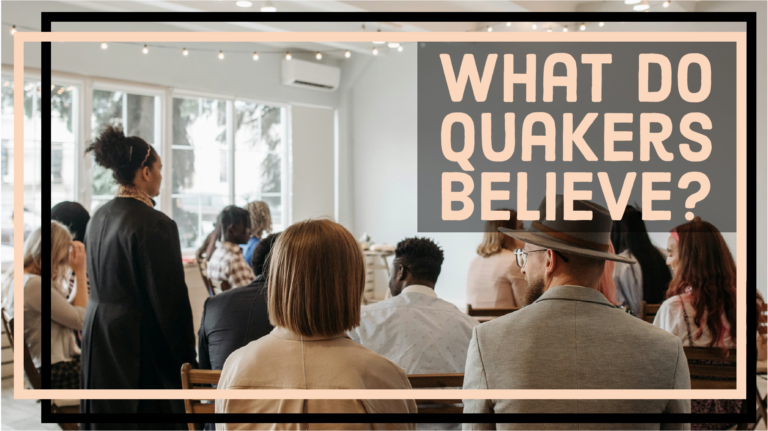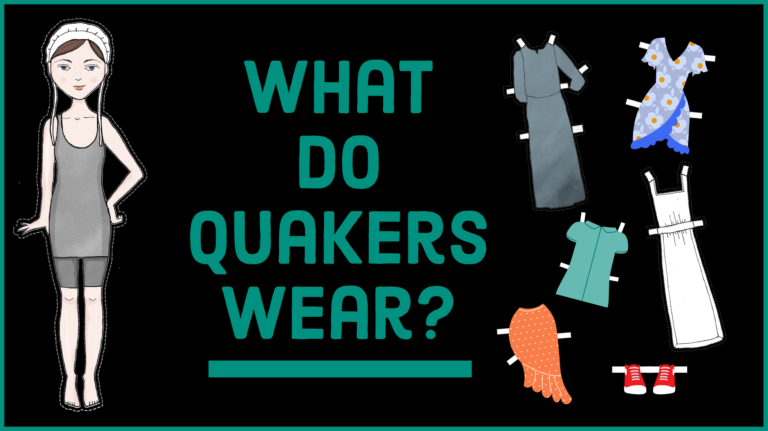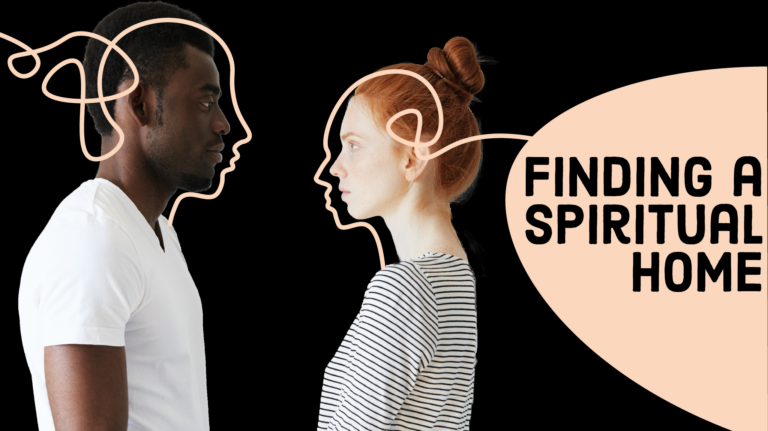Speaking Truth To Power: Answering The Call
Indianapolis First Friends is a semi-programmed meeting that has seen an influx in membership since returning to in-person services after the pandemic. That has meant lots of people who are new to Quakerism. It also means lots of people who are unacquainted with the many Friends who have dedicated their lives to “Speaking Truth to Power.”
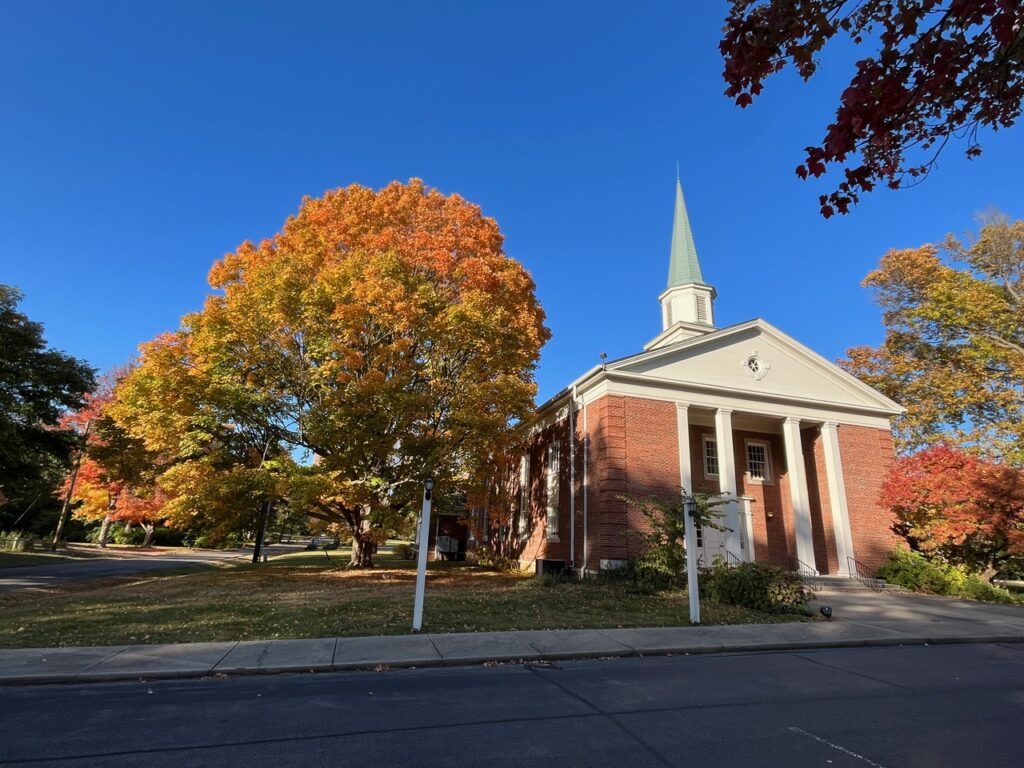
On this episode, Pastor Bob Henry shares a message that explores the life of outspoken feminist, pacifist, and abolitionist Lucretia Mott. We’ll also hear how music plays a part in this meeting and hear vocal ministry during waiting worship.
Subscribe so you don’t miss an episode!

Sign up for our free live Zoom event: Help! There’s an Election Coming!: Diane Randall and Emily Provance on Quaker Action Amidst Election Tension. Tuesday, Oct. 1 at 7 pm ET.
Leave a comment below to share your stories and thoughts!
Download the transcript and discussion questions.
Discussion Questions (by Bob Henry)
- How may my curiosity lead to more action? What questions do I need to be asking?
- Have I heard a call from the Spirit that I’ve not responded to? What should I do with that?And if not, how might I open myself up to hearing that call this morning?
Georgia: Hi everyone. Before we get started, I wanted to remind you that we’ve got a free, live Zoom event coming up Tuesday, Oct. 1 at 7 pm. Eastern standard time. It’s called “Help! There’s An Election Coming!” and we’re going to talk about how Friends can respond to the political tension happening and how to engage beyond the election. I think it’ll be really helpful even if you’re not in the US, because I bet there has been some divisive rhetoric and some things happening in your government that haven’t set well with you and you might want to know…what do I do now?
Our panelists are Diane Randall, the General Secretary Emeritus of Friends Committee on National Legislation and Emily Provance, a traveling minister who has been helping Quakers and non-Quakers think about election violence. We’re also going to have time for a Q&A and it’s going to be great and helpful. So please join us!
Go to QuakerPodcast.com/events to learn more and to register. We’ve also got a link in our show notes.
Ok. On to the episode.
Friend 2: I am going to make a commitment to myself For the remainder of my years to be curious and to always speak truth to power as gently as I can, but to show the same kind of courage to stand for equality now and for the remainder of my life, and to be a nuisance If I have to.
Various: Thee Quaker Podcast. Story, spirit, sound.
Georgia: It’s Georgia Sparling here. Jon will be back for next week’s episode but in the meantime, I thought I’d do a quick check in. September is about over, which I can’t believe. It’s still 90 degrees everyday down here in Mississippi, but the end of September means the end of Season 2 is almost here.
Our regular season will wrap up at the end of October and then we’ll be working on a whole new bevy of episodes for our third season which will start in the new year. This feed won’t be completely silent by any means. We’ll have some bonus episodes to share with you, plus, if you’re a monthly podcast supporter you’ll get a few extra communiques from us. In fact, we just sent out a mini episode to those of you who are monthly supporters as an extra thank you.
And side note, dear listeners, you can become a monthly podcast supporter any time you like and get access to the perks, both past and present. Just click Support at QuakerPodcast.com.
Anywho, we have some great and timely episodes coming up for the end of the season. We’re going to talk politics in a Quakerly way, we’ll get a check in on what’s been going on with Thee Quaker Project, the nonprofit of which we are a part and more.
But today, I’m excited to bring you another vocal ministry episode. As a reminder, these are opportunities to visit Quaker meetings around the world and to hear the messages that are resonating with them. This time we’re going to Indianapolis First Friends in Indiana, which is a semi-programmed meeting that has seen tons of growth since the pandemic. Lots of churches and meetings faced attrition after the pandemic, yet Pastor Bob Henry says they unexpectedly saw a 20 percent increase in attendance, and lots of those new people are also new to Quakerism, so they haven’t been acquainted with the rich legacy of Quaker activists. So, Bob’s current sermon series, Speak Truth To Power, is an introduction to some of those people and their stories, and today we’ll get to hear about Lucretia Mott.
Before we hear the sermon, Bob and First Friends director of Music Eric Baker are going to tell us about their journeys to Quakerism and what it’s like at their meeting. So let’s get started.
Bob: I’m Bob Henry. I’m the pastor of Indianapolis First Friends. I’ve been here for about seven years. I serve alongside Beth Hendricks and our associate pastor and Eric Baker, our music minister. I just started my 29th year of ministry. I was not a birthright Quaker. I was actually a birthright Lutheran. I grew up here in Indiana and and grew up in the Lutheran Church and went to Lutheran grade schools, Lutheran high schools, even a Lutheran college and served as a director of Christian education in the Lutheran Church for almost six years before I really started feeling a call to move out of being a director of Christian education and into something else. And so I went back to school at that time to get my master’s degree at Wheaton College and I studied spiritual formation. And it was there that I was first introduced to my first Quakers, but I spent about six years as an Anglican priest, even served under the Bishop in the cathedral.
And then things kind of took a different turn. I went into campus ministries at Huntington University, became a campus pastor, also was an adjunct professor. And I started my doctoral work. And that’s when I really met Quakers because I started my doctoral work at George Fox Evangelical Seminary, which is now Portland Seminary. I met Carol Spencer, a Quaker historian. And she saw in me something that surprised me. She said, I think you’re a Quaker. And I said, wow, nobody’s ever said that. And so we started the journey. And I ended up looking at taking a call as a pastor at Silverton Friends in Silverton, Oregon. I’m a theological mutt.
Georgia: Bob says becoming recorded, which is the lingo used for become a recognized Quaker minister, took him 10 years and happened during the pandemic after he’d returned to Indiana to work with Indianapolis First Friends.
Bob: So I was actually recorded in my backyard on Zoom at our yearly meeting sessions. It was an honor because I really feel that the recording process is allowing God to ordain the person and letting the Friends that are surrounding me at the time to record my gifts and talents. And that was a beautiful opportunity to have my family and my community surround me in that time.
Georgia: First Friends music minister Eric Baker also came to Quakerism after years in more evangelical or protestant ministry
Eric: I have been a part of not only this meeting, but the Quaker faith and that whole conversation for about 12 years now. I walked into First Friends having read some Quaker authors in the past and resonated with people like Phil Gulley and people like Parker Palmer. And I thought, I could check this place out, see what this is about.
My background is evangelical, conservative evangelical even, so that’s what I was coming from. was in full-time ministry, really music worship ministry at different churches, the most recent being a very large, non-denominational, what some people call a mega church on the northside of Indianapolis. Left there, didn’t really have any desire to to keep doing that.
So yeah, was 12 years ago when I’ve been a part of the meeting ever since. I became the director of music there in.v I was just sort of getting to know the feel of really what does a Quaker meeting feel like, semi-programmed in this case, and then more specifically, what does this meeting in particular feel like?
Georgia: Yeah, so what is it like to worship at First Friends?
Bob: What happens on a Sunday morning is kind of a blend of a lot of things. Often we have Eric playing music, light music over top of the kind of the chatter that’s going on.
But then there’s a clear break of that and we center down and we start worship. There’s always a welcome and introduction of any announcements. We always have an opening song or opening hymn that we all sing together. Then we move into, I give a prayer, just a basic pastoral prayer that leads into some special music. During the year, we always have the choir.
Georgia: That’s not something that you see at a lot of Quaker meetings. Eric says he has an “eclectic approach” to the music at First Friends, which we’ll get a taste of later in the episode.
Eric: We do some more sacred choral music. We’ve got some great arrangements of some spirituals, even African-American spirituals. We do some choral arrangements of what you might consider more secular tunes. Like we’ve got an arrangement we’re working on right now of the Curtis Mayfield tune, People Get Ready. But just songs that really I feel like align with who we are with our values.
There are going to be times where we are sitting and reflecting on certain queries or a certain topic or scripture or something like that. And I think the music can really help to get people prepared for that time. So, I like to think of it as just setting the table as people come in and we want to set that table in a way that A is appropriate, B thinking about intentionally thinking about where we’re headed today in our topic and maybe this song in its tone or even the lyrics of a song, even though it’s not being sung, are applicable to today’s conversation or this scripture or whatever we’re going to be going to be discussing.
Georgia: The service also includes a children’s message, and of course, Bob’s message followed by 15 to 20 or even 30 minutes of waiting worship.
Bob: And one of the things that the new people who have come they value is that time of silence on on Sunday morning.
Eric: I love the fact that I can just be during that time, just part of the community, just part of this body. I’m sitting with these queries just like everyone else is. And occasionally I’ll even get up and say something that I feel like maybe is on my heart and is relevant to this conversation or a way that today’s message has specifically challenged me. But then when we start greeting, I make my way up to the piano and start to lead us in that closing hymn.
Georgia: The choir as well as the organ are just part of the ways in which First Friends differs from many meetings. In fact, Bob said people often drive past it, not realizing that the colonial facade is actually a Quaker meeting.
In the past few years, though, more people have discovered that the church has a lot to offer.
Bob: Indianapolis First Friends is a extremely diverse place and it’s not by ethnicity, it’s by theology. And the reason being is most of our people have been on a journey. Many of them have come to us post-COVID. They found us online in the midst of COVID trying to figure out how to move away from maybe some of their frustrations in their churches at the time, the political rhetoric. They were seeking a different, you know, a different take on not only Christianity, but also on the world at the time. The minute we opened our doors after COVID, about 45 new people showed up.
It’s changed the face of the dynamic that is First Friends. I mean we went from when I first got here seven years ago, we were mostly 50 plus age group, but now we’ve balanced that out with lots of new folks that are in their 20s and 30s, just starting families, we’re kind of bursting at the seams with kids, which is a sign to me of life and thriving.
It’s clear in our messaging that we’re welcoming and affirming and that we want everyone to find a place here. They can ask questions, which that’s always a huge surprise. Most of the churches in our area frown on people asking questions or having doubts. We’re very open about that. You can do that and be amongst us and you don’t have to have a specific theology.
Georgia: So tell me a little bit about what you’re going to be talking about in particular this week and how are you preparing for that?
Bob: This week is the second in a series. Last week I talked, I kicked it off by talking about speaking truth to power and where that came from and that term and Bayard Rustin and the Speak to Truth, but the whole point of this this sermon series is to really highlight individual Quakers of our past and then translate it into today. This week is Lucretia Mott and and how she answered the call. And then I’ll translate that into, OK, what can we take away from this today and how can we live that out still today?
There’s so much that is relevant.
But sometimes I think what’s happened is Quakers have left the history behind and forgot how to translate it into today. so thus we kind of gotten complacent. We’ve gotten, I said last week even, maybe a little lazy with our history and our action. And I think I think there’s a hunger for us to return to those things and figure out how the people in our pews on Sunday, how they are going to hear the call again, stand up and do the things that these ordinary people, these ordinary Quakers in the past did to change our world. And I think that there are young people here and there’s older folks here that are hearing that call and are standing up.
Georgia: After the break, we’ll take you inside First Friends recent meeting to hear Bob’s message and more!
You may remember an announcement a couple of months back about the World Plenary Meeting of Quakers held by the Friends World Committee for Consultation.
Well, it was a success! In August, a diverse group of around 500 Quakers from 53 countries met in South Africa and online for the World Plenary Meeting.
And now with World Quaker Day being next Sunday, October 6, FWCC invites Friends everywhere to engage with the World Plenary Epistle and other documents outlining the experience and to share these with their local Friends church or meeting.
Head to fwcc.world to find out more and take part.
Welcome back. Before we head into the service, I just wanted to note that it has been edited for time.
Bob: Will you pray with me? God, open our eyes and unstop our ears that we may see your light and may hear your heartbeat reflecting and resounding within our chests, in those of all of our neighbors near and far, in all creatures and plants and in the ground we walk upon. And when we finally are able to yield to the leading of your rhythm and flow, may I come to walk cheerfully over the world, answering your seed in all. Amen.
Scripture reader: Our scripture reading today is from Isaiah. It is chapter 58, verse 11. The Lord will guide you continually and satisfy your needs in parched places, and make your bones strong, and you shall be like a watered garden, like a spring of water whose waters never fail.
Bob: I’ll never forget my first trip to Philadelphia with our youth affirmation class. The reason we take the trip is because of the saturation of Quakers influence and history in Philadelphia and its impact on the founding of our country. At one time, there were five Quakers meetings within the city blocks of historic Philadelphia. One of my highlights was visiting one of those five Arch Street Meeting which stands as an enduring symbol of the people who created Philadelphia as a holy experiment. Arch Street was built to house the men’s and women’s Yearly Meetings, which were the business sessions of the Religious Society of Friends for Philadelphia and remain still today as one of the oldest active houses of worship in the city.
While we were there, our tour guide invited some of our women from our group to sit on the very bench where Lucretia Mott worshiped, equipped and learned to speak her truth to power at Arch Street, meaning yet to really understand the depths of all that took place on that very bench where we’re sitting. I must give you a little bit of Lucretia Mott’s story.
She spent her first 11 years on Nantucket Island. From her time there, she took away her Quakers roots, obedience to the inner light expressed in action and the Nantucket way life led with steadfastness, resilience, love of family and a sense of humor. She and her mother developed a relationship that was deep and supportive, and with her mother’s help, she struggled to curb her tart tongue and control her temper. From her father, Thomas Coffin, Lucretia gained a sense of just how big the world was. She spent time with him down on the wharf, encountering Black and white and Portuguese and Native American and Cape Verdean sailors and sea captains. She asked endless questions to satisfy her curiosity. And when he and when he returned from long voyages to trade for goods in South America or even China, or to hunt for whales — yes, whales — She listened to his stories of faraway places and people, and when he returned from a three year trip that included capture of his ship, trials to recover it, and then the long trek over the mountains to Brazil to get his ship home, Lucretia gained a legacy of courage.
Spending time in Quakers meetings for worship two times a week was difficult for an energetic Lucretia, but taught her to search for what God wanted her to do and the need for obedience to answer that she received when Elizabeth Cogshall, a public friend, spoke in meeting for worship one Sunday about living simply Lucretia was so moved that she knew she had to act to show this obedience, despite her love for the blue bows that adorned her shoes, she hurried home, found scissors, cut off the bows, and convinced her sister Eliza to do the same.
Throughout her life, Lucretia expressed her obedience to the call to correct injustices, to take care of the poor and the oppressed and marginalized through her spoken ministry in her Quakers community, but also in her actions in the community and in the wider world. And more often than not, she sought to involve her family and her friends in whatever actions she chose. In this she was supported by her husband, James and her large, extended family, and they traveled with her to meetings and helped welcome the many visitors who came to support and to advise and participate in her action. When Lucretia decided to boycott all goods produced by slave labor, she gave up her favorite ice cream and her children their sugar and molasses candy. Lucretia Mott spoke against slavery in Quaker meetings, so often some of her fellow worshipers admonished her to be quiet. She led women, black and white, to join her in the Philadelphia Female Anti-slavery Association. This group not only gathered to call for an end to slavery, they also raised money to help poor families, encourage the opening of schools for black children and look for ways to find jobs, to empower self support, and she opened the hospitality of her home to Black and white alike.
When told she would not be seated as a delegate to the World Anti-slavery Convention of London, she went away speaking out against the exclusion of women delegates. Huh? That’s going to become very important in her story. She traveled throughout England and Ireland, raising her concerns, answering her critics, showing respect for diverse views. Was during this time she met Elizabeth Cady Stanton, became her friend and mentor. Eight years later, in 1848 the two joined by three other Quakers, women initiated the Seneca Falls Women’s Rights Convention in upstate New York, where a Declaration of Sentiments based on the Declaration of Independence was developed and approved, and in it was a call to full citizenship for women, including the right to vote, and a statement of the ways in which. Women were kept from reaching their potential.
This was an issue that would consume her for the next 30 plus years. Lucretia Mott was a pacifist and believed strongly in non resistance. Many times she and others in anti slavery and women’s rights works debated non resistance, especially during the Civil War, President Lincoln opened the ranks of the military to blacks and built a training camp, ironically called Camp William Penn, across the street from lucretia’s home outside of Philadelphia, she visited the young recruits who were fighting for a freedom that they never had. She spoke to them about her hope that a time would come when wars were not needed, and brought fruits and vegetables from her own garden to enhance their bland food and when they departed, she sent them off with prayers for their safety.
While her energy declined in her later years, she knew she had been faithful in her duty to be obedient to her inner call and to the inner light and to live and speak her truth. She even grew to accept her anger and actually use it to lead her to action. She had lost many of those she loved, but she was still surrounded by family and friends, even till the end at the graveside service, there was a silence who will speak? And another answered, No one. The preacher is dead. Obviously, I cannot go into detail about all of Lucretia, life in one sermon. And I hope these highlights have whet your appetite a little bit, and that’s what this whole series is about. For today’s purposes, though, I think there are several takeaways for us. The first is Lucretia’s insatiable curiosity.
I find in many circles, curiosity is a more acceptable way to talk about raising questions or admitting doubts, but it’s essential to our journey of faith. Folks, there’s nothing wrong with being curious. We should be more like Lucretia in this way in our world, her determination to be curious led her to ask some very important questions, from the whos it will affect to the whys of inequalities, to the hows of injustices, to the whens of speaking truth to power, as well. Her questions led her to seek ways to respond, and on many occasions, while sitting on that meeting bench, Lucretia heard the Spirit’s call to action, and she rose from that bench and she changed the world. I often wonder who is sitting amidst our pews here, at first, friends that is hearing the Spirit’s call and is obediently ready to respond. Or for whom will young people come here in 200 years to sit and take a photo where that person heard the Spirit’s call and responded and changed their world? I think there’s some of you who are curious, they’re seeking, that are wanting to ask those questions.
It’s amazing to me to think that at 76 years ago, a young feminist rose from her Arch Street bench and headed to Seneca Falls for her first women’s rights convention, and for 30 of the next 72 years, her patient demanding work saw the 19th Amendment be ratified and women received the right to vote in our country. And her legacy continues on without Lucretia Mott and the other women at Seneca Falls, we would not this year have the possibility of a woman of color holding the highest office in our country. Talk about a continued legacy.
Lucretia Mott is responsible for Kamala Harris being able to be where she’s at. Just think about that. That is a legacy, especially in our country. When we continue this legacy, the. We take up her voice, let’s bring it back to a realistic and human level once more. We must not forget that this trailblazer, and it’s clear just reading this stuff about her, lost her temper. On occasion, she raised her voice, she let her passions, as we say, get the best of her as well. At times, she would ramble on and on, but amid her flaws, she persisted, she fought, she spoke up, and she did it through genuine love and with authentic support of a diversity of people who actually called her friend. I can relate to this Quaker, and these are her words. Those who go forth ministering to the wants and necessities of their fellow beings experience a rich return their souls being as a water garden and a spring that faileth not. Those words sound familiar. Those were our scripture for this morning, Lucretia went forth ministering, and she’s calling each of us now to follow her.
May we hear the Spirit’s call and speak truth to power and get out of our seats and go do something to change our world. So as we head into waiting worship, I ask you to ponder these: One, how may my curiosity lead to more action? What questions do I need to be asking? Have I heard a call from the spirit that I’ve not responded to. What should I do with that? And if not, how might I open myself up to hearing that call this morning? Let’s take this time.
Georgia: Several Friends spoke out of the silence following Bob’s sermon and with their permission we’re sharing a portion of that with you today.
Friend 1: Just the other day, I was taking my youngest to school, and he had watched the Mission Impossible movie where Tom Cruise’s character drops from the ceiling and there’s all these security measures protecting something. And he said, “Wow, is that real? You know, can we do we actually have things like that in real life?” And then we got to talking about, what would you protect with your security system, and what are some of the most valuable things in the world? I said, “Well, you know, actually, you know, what’s really funny is, I think the things that are most valuable are things that are intangible, that we couldn’t even protect them with a security system.” But they’re some of the most important things in our lives.
And I was thinking about my grandmother, who was an amazing person in my life, but she would always she called herself a dumb cluck from a farm. She grew up in Maryland. Her dad was eventually became a sharecropper because he lost his business. It was during the Depression. She was not Lucretia Mott. She wasn’t going to stand up and speak to a crowd of people, but she changed my life in a powerful way and provided stability in my life when I needed it, and hot meals and a place to stay, I just would say that I realize we’re not all going to be Lucretia Mott and go out and speak publicly and do these things, but we’re all given different gifts, powerful gifts, those all are so valuable. So I would just encourage everybody to use your gifts and enrich people’s lives with them.
Friend 2: I want to be Lucretia Mott. She died when she was 87. Oh, and thank you, Bob for introducing her to me. I learned a lot this morning. I got some time left. I’m not 87 yet, and I find myself thinking I am going to make a commitment to myself for the remainder of my years to be curious and to always speak truth to power as gently as I can, but to show the same kind of courage to stand for equality now and for the remainder of my life, and to be a nuisance if I have to, but it’ll be good humored.
Eric: We’re going to sing together before we go. Hymn number 281, and we’re going to sing about Lucretia Mott.
All right, let’s try this.
On the island of Nantucket. She was born beside the sea. All her long life, she fought bravely to make slaves and women free, and she told us that where God dwells, there must be true liberty. Her light still shines for me.
Thank Thee, kindly Friend Lucretia. Thank Thee, kindly Friend Lucretia. Thank Thee, kindly Friend Lucretia, for thy light still shines for me.
In the town of Philadelphia, she hid the fleeing slaves for the freedom of her sister. She did cross the ocean waves, and she asked Ulysses Grant to grant a pardon for the brave her line to shines for me. Thank Thee, kindly Friend Lucretia. Thank Thee, kindly Friend Lucretia, thank Thee, kindly, Friend Lucretia, for thy light still shines for me.
Bob: Nothing like Quakers changing the Battle Hymn of the Republic. I want to send us with the words of Lucretia Mott today: “Let our lives be in accordance with our convictions of right, each striving to carry out our principles. All God’s people said, Amen, go.
Georgia: After the service, Bob and I met again to talk about how it went.
Bob: So Sunday was really, I think it was really good, very upbeat. I was moved by the stories that were shared out of the silence. I think that was just, just beautiful that people were vulnerable and talked about the, you know, how, how they saw people in their lives, speaking truth to power, maybe a little different than Lucretia Mott, but yet at the same time in the same, you know, in the same manner. So,
And I had great feedback and great conversations afterwards. It was just an overall good morning to be able to connect some of those pieces, but also then to see so many folks who are starting to feel like I have a place, have a voice, I have an opportunity to be surrounded by people here that I can trust and I can speak out and speak truth to power myself, which is what our hope is.
Georgia: I was really interested in your queries and kind of how you came up with some of those. And I’m curious how those queries have worked on you kind of in advance of delivering this message.
Bob: Yeah. So how I, how I come up with queries is really asking myself, what am I trying to get out of this? What, what, what is, if I’m trying to help somebody to understand, what, the message or what the takeaway is. I want it to be something that you kind of have to go, I have to sit on this and think about this and I have to ponder it.
I believe that one of the greatest things about Quakers is that we’re willing to ask questions. And when I was a part of kind of the Lutheran Church and or Anglican backgrounds, we never we never felt comfortable like leaving it with a question. And every Sunday I leave it with a question. I leave it with some most of the time two or three questions for people to ponder. And I think that allows people to know that there’s a place to ask questions and to process at First Friends.
Georgia: As the pastor, if somebody comes to you feeling like they have a leading or they are feeling like they need to act on something, how do you counsel them?
Bob: That’s a great question. Every single one of the people who come that have a leading or they want to do something, it’s always a different process. It all depends on them. And often it’s a lot of, like I just said, questions, asking them questions like, how did you come about this? Where did this come from? Where’s this leading coming from? Is it coming from you personally or is it coming from God? is it, you know, is this something, you know, other people are going to gather around you and help you with, or is this something the meeting can help you with?
Now, if it’s something that you have to make a decision on right away or act on right away, most of the time I say, let’s do it. Let’s go.
Let’s speak up, you know? And usually that’s around some, you know, social or civil right issue, something like that. I’ll always encourage people to speak that as soon as they possibly can because it’s probably needed in that moment. But if it’s something that can wait, we have a ministry at First Friends that was not here when I came.
And I gave a sermon one Sunday and a lady in our meeting was moved. And after the service, she came to me and she said, I’d like to meet with the pastors and I would like to discuss possibly doing this ministry. And it was our stamp ministry. And she said, I feel led, I feel that the spirit is nudging that I take this over. And what do you think? What should we do? And we sat there and asked a bunch of questions and kind of.
How did this come about? And then she said, I think this is what I’m supposed to do. And I said, we think so too. And so we’ve supported that. Now we have the whole stamp ministry at First Friends.
Georgia: Let me step in to clarify, this ministry collects collectable stamps that are sold with proceeds going to Right Sharing of World Resources.
Bob: People from all over the world send us stamps and that money. Then we have a whole team of retired folks and stamp collectors and people who snip and and prepare stamps to be sold.
I think one of the stamps was like worth $500 alone, just one stamp. So at first we thought, wow, this isn’t going to bring much money in. And the person who had the vision spread that vision out to other folks and got the right people involved. And now we have two major stamp collectors involved in it. And it’s just been amazing.
And it all came one Sunday after I preached a message and this woman said, I feel the spirit leading me to do this. And it was really cool. it’s really, I’m, I’m, I’m so honored and pleased that this is developed the way it has.
Presenting a message without some application or without some kind of connection to who we are now That just leaves it in the past if we don’t do that And I think if we if we don’t make that we’re doing a disservice to the Quaker world I think there’s been a lot of disservice done Amongst Quakers of keeping these people kind of held up on pedestals in the past and not translated to today.
Georgia:Thank you.
Bob: It’s been great to meet you, Georgia.
Georgia: Thank you for listening and thank you to Bob Henry, Eric Baker and Indianapolis First Friends for sharing your service with us. If you’d like to hear an unedited version of Bob’s sermon and other sermons in the series, click the link on our episode page at QuakerPodcast.com. While you’re there, check out the discussion questions, transcript and also sign up for our Oct. 1 live Zoom event titled “Help! There’s an Election Coming!” With Diane Randall and Emily Provance. We’ve also provided a link to that in the show notes.
This episode was reported by me, Georgia Sparling, and Jon Watts. Jon also wrote and performed the music for this episode.
Studio D mixed the episode. Your moment of Quaker Zen will be read by Grace Gonglewski.
If you like what you hear, please consider becoming a Podcast supporter — you can do that on a monthly or a yearly basis. Head to QuakerPodcast.com and click on Support to learn more.
And now for your moment of Quaker Zen.
Grace Gonglewski: Rosemary Field, 2024: I’ve learnt about the fundamental premise of Centering Prayer: surrender, or, more truthfully, ‘being surrendered’ to what is. It’s a deep acceptance, not a resignation to but an embracing of what is, in my own life and in the world, with all its pain and the sadness as well as joy and hope.
Georgia: Sign up for daily or weekly Quaker wisdom to accompany you on your spiritual path, just go to DailyQuaker.com. That’s DailyQuaker.com.
Reported by Georgia Sparling and Jon Watts. Hosted by Georgia Sparling.
Original music and sound design by Jon Watts (Listen to more of Jon’s music here.)
Mixed and mastered by Studio D.
Episode artwork includes an image from Freepik.
This episode was sponsored by Friends World Committee for Consultation. Find resources for World Quaker Day, Sunday, Oct. 6 at fwcc.world.
Supported by listeners like you (thank you!!)
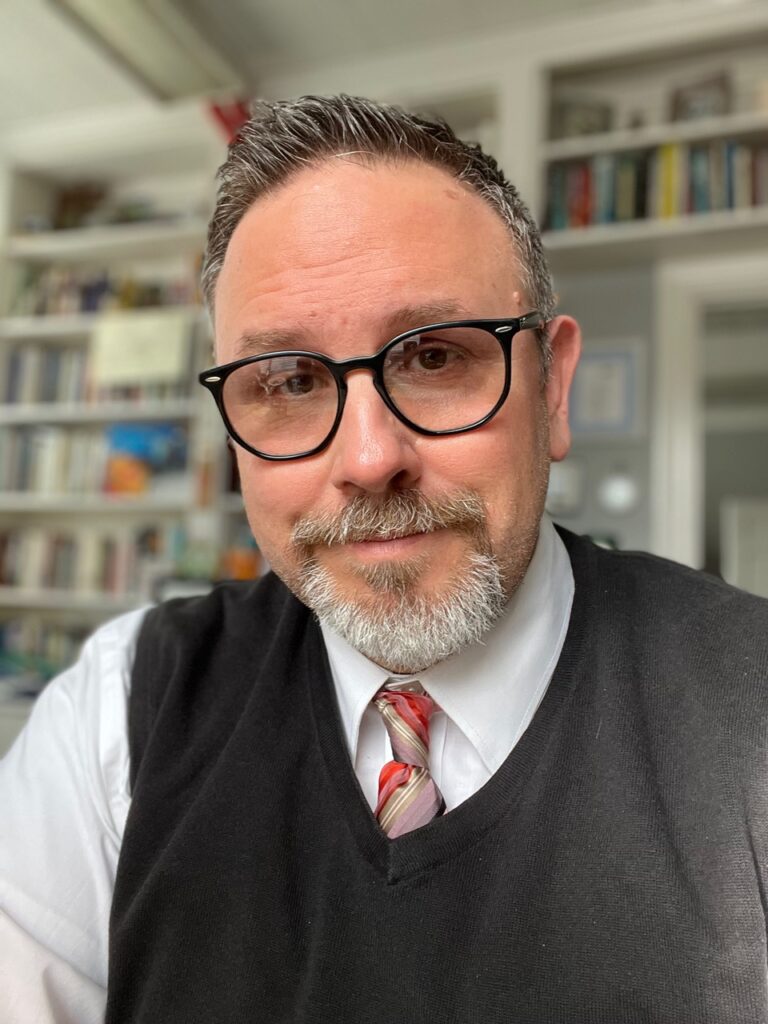
Referenced in this episode:
